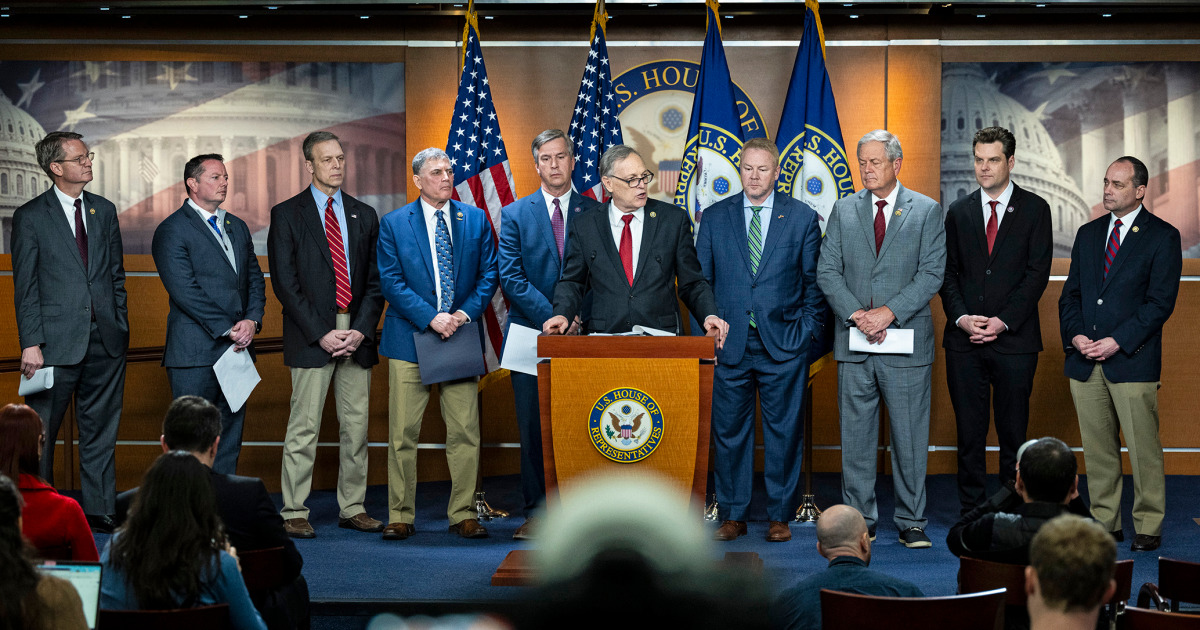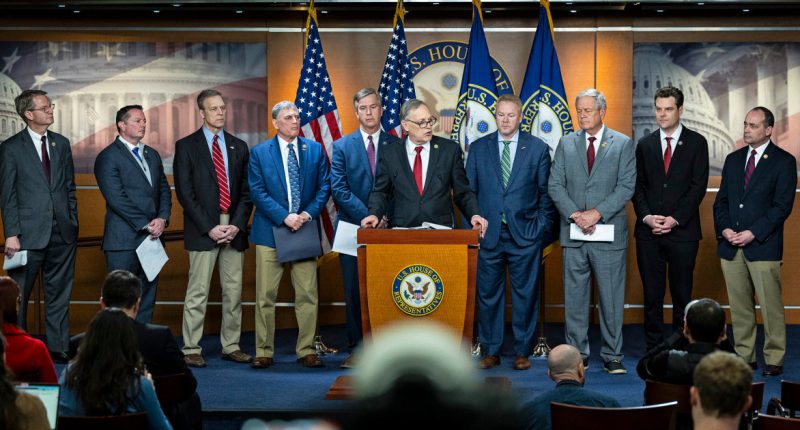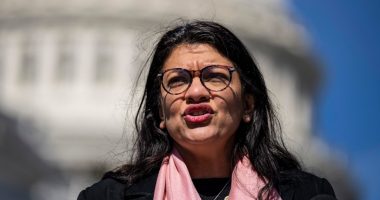
Welcome to the online version of From the Politics Desk, an evening newsletter that brings you the NBC News Politics team’s latest reporting and analysis from the campaign trail, the White House and Capitol Hill.
In today’s edition, national political reporter Bridget Bowman and CNBC political finance reporter Brian Schwartz report on why prominent GOP megadonors are targeting Super Tuesday primaries in deep-red House districts. Plus, senior political editor Mark Murray breaks down how Joe Biden is in worse shape than his recent predecessors at the same point in their re-election bids.
The Super Tuesday battles that could have big consequences for the House GOP
By Bridget Bowman and Brian Schwartz, CNBC
The political world’s attention is on the presidential election heading into Super Tuesday, when more delegates are up for grabs than any other day in the 2024 nominating fight.
But it’s also the first major congressional primary day of the year — a date GOP megadonors who are concerned with the direction of the conflict-ridden House Republican conference circled long ago on their calendars.
Do you have a news tip? Let us know
Two super PACs financed by a small group of prominent donors quietly spent over $6 million against five Republicans running for deep-red House seats in Super Tuesday primaries, according to Federal Election Commission records.
Their apparent goal? Limit the influence of the hard-right House Freedom Caucus.
The super PACs, Conservatives for American Excellence and America Leads Action, have targeted candidates who are either endorsed by the political arm of the House Freedom Caucus or would align with the caucus if elected. The groups have also targeted one candidate endorsed by former President Donald Trump: Brandon Gill, who is running in Texas’ open 26th District.
The Freedom Caucus has been in conflict with House Republican leadership since it formed, including helping force the resignation of then-Speaker John Boehner in 2015. But those conflicts have been especially acute over the past year, with the GOP majority at only a few seats.
Most of the eight Republicans who voted to oust Kevin McCarthy as House speaker last year were Freedom Caucus members. And members of the group have opposed deals struck by new Speaker Mike Johnson in attempts to keep the government open this year.
If Republicans keep the House in the November election, it’s possible the next majority could be similarly slim. And the new super PACs appear to be trying to make sure the Freedom Caucus’ ability to tank legislation or threaten speakers doesn’t grow in the next Congress.
“These races really determine the heart and soul of the caucus,” said David McIntosh, president of the conservative Club for Growth, whose PAC has endorsed Gill and North Carolina Republican Bo Hines, another target of the new super PACs, ahead of Tuesday’s primaries.
Biden has to dig himself out of a historically deep political hole
Analysis by Mark Murray
The state of the Biden presidency is … still not strong.
That’s the unmistakable conclusion from the national and battleground state polls that have been released before President Joe Biden’s State of the Union address Thursday.
He narrowly trails Trump in hypothetical general election matchups (although the results are often within the margin of error). His job approval rating is lower than Trump’s was at this same point in time in 2020. And he’s slightly more unpopular with the electorate than Trump is — which was never the case for Biden in his 2020 victory.
Now, the standard caveats: We’re still eight months away from the general election. Trump isn’t popular himself and is dealing with multiple indictments. Poll numbers can change. And polls haven’t exactly had the greatest track record in recent elections.
But what stands out about Biden’s polling situation is that it hasn’t improved since late last year when there were already clear warning signs. In fact, it’s gotten worse. Just look the recent national NBC News poll:
- Biden’s approval rating stood at 37% among registered voters — down from 40% in November.
- He was behind Trump by 5 points in a hypothetical matchup — up from his 2-point deficit in November.
- And Biden’s favorability rating with the electorate was 36% positive and 54% negative (-18 net rating), while Trump’s rating was 38% positive and 52% negative (-14 net rating).
And compare Biden’s standing with past presidents at this same point in time, according to the 30-year-plus history of the NBC News poll: It’s lower than what the poll showed for Bill Clinton, George W. Bush, Barack Obama and even Trump.
That’s Biden’s political challenge ahead of his State of the Union address — and over the next eight months. He needs to dig out of a political hole deeper than any of his recent predecessors faced.
🗞️ Today’s top stories
- ⚖️ Unanimous decision: The Supreme Court ruled 9-0 that states cannot kick Trump off the ballot over his actions leading up to the Jan. 6, 2021, attack on the Capitol, bringing a swift end to a case with huge implications for the 2024 election. Read more →
- 🎙️ SOTU prep: Biden will attempt to strike a stark contrast with Trump during his State of the Union address this week, while also looking to ease growing unhappiness inside his own party about his handling of the Israel-Hamas war. Read more →
- 👀 The ‘last campaign’: The New Yorker has a deep dive into Biden’s re-election campaign, including an interview with the president himself. Read more →
- 👣 Tar Heel State showdown: Tomorrow’s primaries will set up the biggest — and most expensive — governor’s race in the country this year in North Carolina. The battleground state has leaned Republican at the presidential level, but it has swung the other way at the gubernatorial level. Read more →
- 🏃 Why Hogan runs: Former Maryland Gov. Larry Hogan said he decided to run for a U.S. Senate seat after Republicans killed the bipartisan border bill. Read more →
- 🪪 Identification, please: Eight states have enacted new voter ID requirements since the 2020 election, affecting 29 million adults. Some form of identification is now requested upon voting in 36 states. Click through to see a map outlining each state’s voter ID laws. Read more →
That’s all from The Politics Desk for now. If you have feedback — likes or dislikes — email us at [email protected]
And if you’re a fan, please share with everyone and anyone. They can sign up here.
Source: | This article originally belongs to Nbcnews.com










